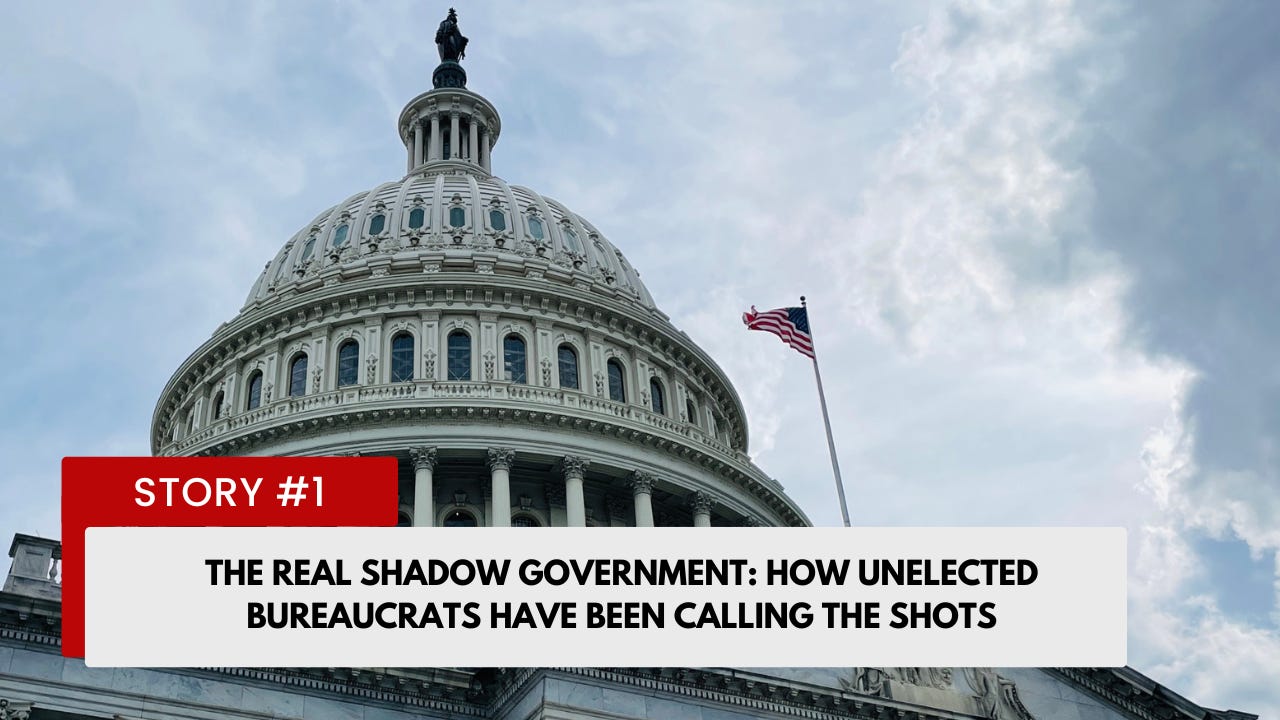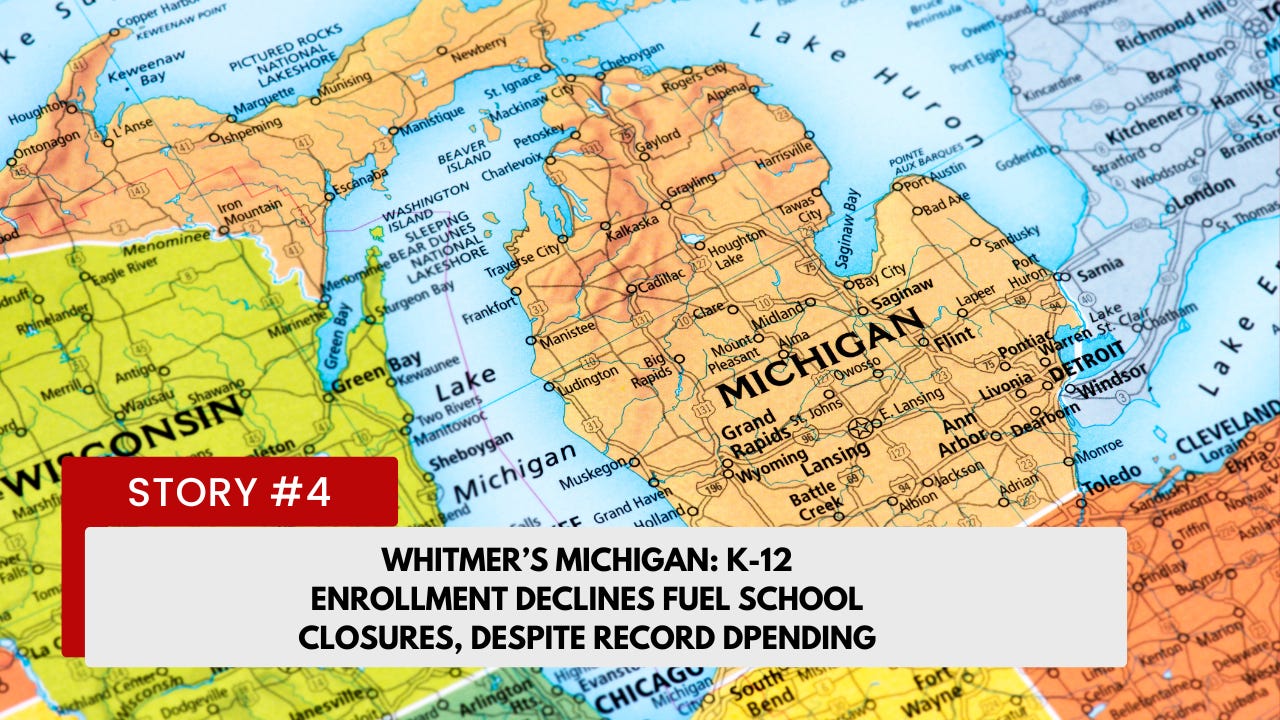Please don’t take my newsletter for granted. I rely on paid subscriptions for the vast majority of my revenue. Without enough paid subscribers, I can’t continue to justify spending 30-plus hours a week on this newsletter and independent journalism. Click the button below to subscriber, you can quit at anytime. Thank-you!


WASHINGTON D.C. - Here’s a scary prospect: an unelected shadow government operating beyond the limits of the Constitution and the separation of powers, and doing so with no accountability.
Many are portraying President Trump’s Department of Government Efficiency, or DOGE, this way. Tasked with modernizing technology, increasing efficiency, and rooting out waste, fraud, and abuse throughout the executive branch, the Elon Musk-led team has even been accused of “conducting a hostile takeover of the federal government.”
The truth is that all these characterizations just as accurately, if not more accurately, describe the unelected bureaucrats running the administrative state.
For decades, the Constitution’s limited government of enumerated and separated powers has been undermined by a bloated bureaucracy that rules over practically every aspect of Americans’ lives with impunity.
But the same people maligning DOGE for operating outside the three branches of government with little accountability have rarely, if ever, applied the same standards to this federal Leviathan. Not a peep about what has become an unconstitutional fourth branch of government filled with career bureaucrats that write rules with the force of law, enforce those same rules against individuals, interpret the provisions of those rules however they see fit, and often try defendants in house for violating those rules. Click here to read more.

A Mexican national, who has already been deported once, was arrested and charged with murder in a multiple shooting incident in Michigan, according to reports.
Police in Alpine Township, a northern suburb of Grand Rapids, charged Gilberto Hernandez-Mendez, 42, with eleven charges including murder, attempted murder, and a slew of weapons offenses stemming from a February 22 incident that left one dead and two more wounded, WWMT-TV reported.
Investigators allege that Hernandez-Mendez shot three women at an Alpine Township residence at around 2:30 a.m. after a “domestic dispute.”
Upon arriving at the scene, officers found Norma Ramirez-Martinez, 56, dead. The deceased was the mother of the suspect’s ex-girlfriend. The girlfriend and another woman were both wounded in the shooting. The girlfriend’s two daughters were also injured, police said. Click here to read more.

WASHINGTON, D.C. – America First Legal (AFL), supported by Cooper & Kirk PLLC and Ard Law Group, is taking action to defend Adams County, Washington, against the unlawful and abusive effort by Washington state officials to enforce illegal and dangerous sanctuary laws and policies and compel Adams County to violate federal immigration laws.
Last year, Washington state officials threatened to sue Adams County for refusing to comply with the harmful, dangerous, and illegal sanctuary jurisdiction law fraudulently titled the “Keep Washington Working Act.” Now, these officials are unlawfully attempting to force Adams County to sign a “consent decree” that will compel it to violate federal law for the next four years.
To protect American citizens and our Constitution, Adams County is standing up in opposition to this egregious abuse of state power. AFL is defending Adams County so that state officials and their anti-American open-border allies may not bully, coerce, or compel pro-American communities with dangerous sanctuary laws and policies that shield criminal illegal aliens and endanger law-abiding citizens. Click here to read more.

Declining student enrollment is forcing Michigan school districts to consolidate and close schools, despite record spending in recent years.
On Monday, Grand Haven Public Schools unveiled plans to consolidate elementary schools after a decade of declining enrollment that’s expected to continue with the loss of 650 students over the next five years.
“If we do nothing we will not be able to keep our doors open in two years,” Superintendent Kristin Perkowski told WOOD. “That’s the current state with 10 years of loss in students.”
Declining student enrollment is forcing Michigan school districts to consolidate and close schools, despite record spending in recent years.
On Monday, Grand Haven Public Schools unveiled plans to consolidate elementary schools after a decade of declining enrollment that’s expected to continue with the loss of 650 students over the next five years.
“If we do nothing we will not be able to keep our doors open in two years,” Superintendent Kristin Perkowski told WOOD. “That’s the current state with 10 years of loss in students.” Click here to read more.

The now-shuttered U.S. Agency for International Development (USAID) paid Ukrainian models and designers to go to Paris Fashion Week and other frivolous luxuries, Sen. Joni Ernst (R-Iowa) said Wednesday.
Ernst revealed that USAID did not report the expenditures in public databases and tried to block her staff from seeing them, claiming they were classified. In reality, she said, they were not classified, merely embarrassing for how wasteful they were.
Ukraine’s leader Volodymyr Zelensky has demanded billions from American taxpayers, raising the specter of gruesome deaths and suffering. But “staff learned that the aid intended to alleviate economic distress in the war-torn nation was spent on such frivolous activities as sending Ukrainian models and designers on junkets to New York City, London Fashion Week, Paris Fashion Week, and South by Southwest in Austin, Texas,” a memo obtained by The Daily Wire said.
Ukrainian recipients of “Competitive Economy Program (CEP)” funds included, the memo said:
• A modern women’s attire company ($150,000)
• A trade mission for a fashion design house ($128,000)
• A photographer for fashion design publications ($126,000)
• A purveyor of contemporary knitwear ($161,000)
• A luxury bridal brand ($84,000)
• Marketplace for designer artisanal pieces inspired by folk crafts ($84,000)



















